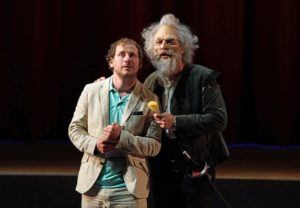
Bregenz Festival 2019 Review: Don Quichotte
A Solid Cast Carries A Production With Quixotic Results
By Eric Simpson(Credit: Bregenzer Festspiele/ Karl Forster)
While “Rigoletto” plays on the Bregenz Festival’s main stage, the famous floating Seebühne on Lake Constance in western Austria, the Festspielhaus offers a chance to see “Don Quichotte,” Massenet’s poignant adaptation of Miguel Cervantes’s immortal novel, “Don Quixote.”
The Best Men Can Be
The new production, directed by Mariame Clément, might seem disorienting on paper. It is preceded by a screening of “We Believe: The Best Men Can Be,” the Gillette ad that aired earlier this year, and in Sunday morning’s performance a skit that featured a Sancho double planted in the audience arguing with his neighbor went on long enough to draw cries of “Musik!” and a few scattered boos from the rest of the crowd.
Yet the production itself, though it treats each act as a quasi-vignette, manages to hang together while jumping through time and space, finding in each scenario a new angle from which to view the sadness of Don Quichotte’s naive idealism. Act one shows actor-doubles of Quichotte and Sancho in seats mimicking those of the Festspielhaus, observing the first meeting with Dulcinea as though reliving it, admiring her as a star of the theater.
The same scene is poetically recalled in Act five, when Quichotte and Sancho are back on an even smaller stage, playing out the scene of the knight’s death to a nearly empty house, with only Dulcinée herself to watch from the second row.
Between these bookends, all continuity of time and space falls away. Act two, the windmill scene, takes place in what looks like a hospital bathroom from sometime in the twentieth century, and ends with the image, both hilarious and sad, of the knight attacking a giant ventilation fan, his lance a toilet brush and his shield the lid.
In Act three, his encounter with the robber band is set in a dark alley, where Quichotte, dressed in an off-the-rack Spiderman costume, is beaten to a pulp by a street gang, a warning to every would-be superhero.
Act four presents a sleek-looking office under harsh lighting, where Dulcinée is a senior manager subjected to the constant harassment of her male colleagues, and Quichotte is a nervous dweeb in a sweater vest. Clément’s reading of the scene compels in the way it cuts right to the heart of the crowd’s cruelty, not just in their mocking of Quixote’s romantic hopes, but in their aggressive treatment of Dulcinea. This is the only time that we see an explicit connection back to the #metoo theme suggested by the Gillette ad, so the attempt to present the entire opera through that lens is not quite successful. The real strength of the staging is the way each vignette cuts deep, seeming to deliver a stinging rebuke to a hopeful view of the world.
The Quixotic Heroes
Gábor Bretz expertly navigated all of these various incarnations of Don Quichotte without ever losing touch with what is both the character’s tragic flaw and his most endearing quality: his ability to endure seemingly endless abuse and misfortune without ever acknowledging the cruel realities of the world around him. Bretz’s portrayal had a sweet earnestness to it, combined with a rich, wooly lyric bass, a robust instrument that occasionally admitted hints of weariness into his vocal characterization.
The Dulcinée of Massenet’s opera is more refined than Cervantes’s downtrodden Dulcinea, but Anna Goryachova brought a quiet sadness to the character that made her performance still moving. This was especially apparent in her Act four aria “Lorsque le temps d’amour a fui,” communicating her intimate lamentation with sighing phrases. It felt like a more candid counterpoise to Act one’s more performative “Quand une femme a vignt ans,” a sultry but athletic number that Goryachova sang with perfect confidence. All this was accomplished with a striking, dark mezzo-soprano tone, smoldering and powerful but opening up into a lovely, light warble at the top.
David Stout was just the sort of baritone needed as Sancho, combining a full, oaky voice with a the buffo charm of a character actor. It falls to Quichotte’s affable sidekick in the end to defend his master’s dreaming idealism from the cruel mockery of the crowd: “Riez, allez, riez” was a passionate rebuke in Stout’s rendition, tearing off his wig as he turned to berate the audience over the swelling of the orchestra.
Sensitive Direction
One of Massenet’s last works for the stage, Don Quichotte feels more restrained than some of his earlier successes, but still has a feeling of rich emotion breathing through the score. Time and again it returns to the theme first heard in Quichotte’s serenade, “Quand apparaissent les étoiles,” the tender melody that embodies the opera’s sentimental core.
Daniel Cohen’s sensitive direction highlighted the delicate details that give the music its feeling of constant life, bringing individual voices out of Massenet’s elegant latticework. The Vienna Symphony Orchestra, the Festival’s primary house band, gleamed under his baton.


